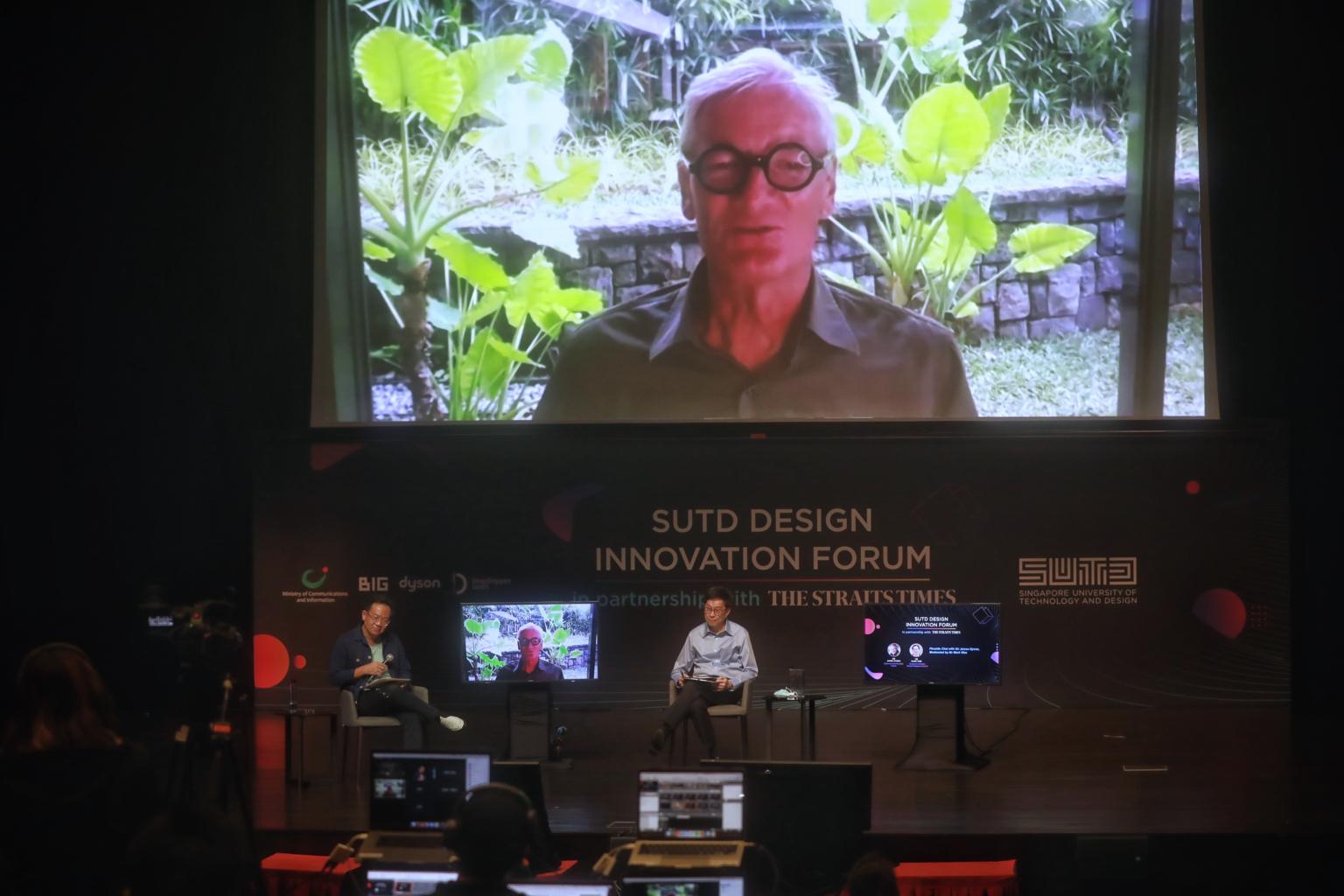'Success tells you nothing': Learning through failure is the path to progress, says Dyson at SUTD forum
Sign up now: Get ST's newsletters delivered to your inbox

Executive director of DesignSingapore Council Mark Wee (left) and SUTD president Chong Tow Chong (right) with James Dyson at the Design Innovation Forum on March 19, 2021.
ST PHOTO: KEVIN LIM
SINGAPORE - It is important to experiment, fail along the way and learn from failures, and schools need to create an environment to foster this, said British entrepreneur and inventor James Dyson on Friday (March 19).
"Failure is the way to progress," said Mr Dyson, who added that if a person fails 95 per cent of the time, "you're doing very well".
"Success tells you nothing. Failure tells us that something is wrong... why it was wrong and how you might overcome it," said the chairman and founder of British technology firm Dyson, which is known for its bagless vacuum cleaners.
Addressing an audience of about 920 through a live stream, Mr Dyson was one of several speakers at the virtual Design Innovation Forum organised by the Singapore University of Technology and Design (SUTD) in partnership with The Straits Times.
On Friday, he addressed some issues with education now, noting that schools tend to teach students to give the right answer and encourage rote learning.
"You should get just as many marks for failing as you do for passing," said Mr Dyson. "Because if you fail, you have the experience of failure, and you have to work out how to get the right answer. Whereas if you always know the right answer, you haven't really gone through much thought."
So, to nurture creativity, a different "atmosphere" is needed at school, where people can experiment, fail and work out how to overcome their failures, he said.
Born in Norfolk, Mr Dyson, 73, spent a year at the Byam Shaw School of Art before reading furniture and interior design at the Royal College of Art. There, he made the switch to industrial design. He was listed as Britain's wealthiest person last year.
He said his own brushes with failure were instructive.
For example, he had a recent failure that cost him £500 million (S$880 million). His electric car project was announced in 2017 but scrapped in 2019.
Though the project failed, "we've applied a lot of what we've learnt into what we're doing now", he said.
Last year, Mr Dyson said that the company was focusing its efforts on developing the battery technology and other technologies from the car project, which his company hoped would take it to "exciting new directions".
Dyson relocated its global headquarters from Britain to Singapore in 2019.
The importance of failure also resonated with panellists at the SUTD forum when they were asked by moderator Mark Wee, executive director of DesignSingapore, on the qualities of good designers.
Harvard-trained Singapore-American architect Brian Yang of Danish firm Bjarke Ingels Group (BIG) said that people need to be open to failing repeatedly and have the tenacity to bounce back from that.
Mr Yang said that failing is what his company does most of the time every day, adding: "Failure as a part of daily life... is equally, if not more important, for learning and creativity."
Besides not being afraid to fail, it is important to be willing to try new things and not be satisfied with the status quo, said the president of SUTD, Professor Chong Tow Chong.
Mr Dyson also said young people are best placed to solve the problems of the world.
Uninhibited by the "experience" of how things used to be done, he said that it is a generation of young people that will solve the world's problems, "through your intelligence, through failure, and through research and design".
Mr Dyson said things are changing all the time with increasing speed, so experience is of little use, specifically with breakthroughs.
"If you're doing something new, it's often better to have very young people, uninhibited people who don't mind making mistakes, people who take a naive, curious approach to creating something new," he said.
He added that to be successful, "we must not be afraid to pursue new ideas, to challenge orthodoxy, and to follow our own beliefs, trying to avoid the negativity of the naysayers".
Good design to Mr Dyson is also about not blindly following what came before, but rather forging one's own path.
And to do this, first come up with the "wrong solution", which might have a solid element of truth, he advised. People have always tried to come up with the right answers, he said, but starting with a solution that does not work or is "stupid" will set a person on a different path from others.
Citing his bagless vacuum cleaner invention, which was inspired by a sawmill, Mr Dyson explained that he had had no experience with vacuum cleaners.
And experts thought his idea would never work.
"But I made it work," he said.


